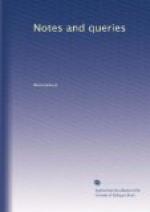“‘Love and hatred,’ says Plutarch, ’corrupt the truth of every thing;’ as experience sufficiently declares it, when we see that which comes to pass, that one and the same thing, in one and the same city, at one and the same time, is related in different manners. I myself, in my own negociation here, have found it so. For it hath been rumoured abroad, that our nation had purchased St. Paul’s church, for to make it their synagogue, notwithstanding it was a temple formerly consecrated to Diana. And many other things have been reported of us that never entered the thought of our nation.”
J.K.
Sneck-up or Snick-up.—Surely this means nothing more or less than what we should write Hiccup! or Hiccough! so, at least, I have always supposed; misled, perhaps, by Sir Toby’s surname, and his parenthetical imprecation on “pickle herring”. I do not pretend to be a critic of Shakspeare, and must confess that I do not possess a copy of the “Twelfth Night” but after seeing your correspondent R.R.’s letter (Vol. i., p. 467.), I resolved to write you a note. First, however, I called on a neighbour to get a look at the text, and he brought me down Theobald’s edition of 1773, where it stands,—
“Sir To. We did
keep time, Sir, in our catches.
Sneck up!”
[Hiccoughs.
The effort necessary to pronounce the word “catches” might help to produce a catch of another sort in the stomach of a gentleman oppressed with drink and pickle herring; and it seems likely that some such idea was in the author’s mind.
DAVUS.
* * * * *
+MISCELLANEOUS+
NOTES ON BOOKS, CATALOGUES, SALES, ETC.
The readiness which many of our friends have evinced to illustrate that most curious, interesting, and valuable of all gossiping histories, the recently completed edition of The Diary of Samuel Pepys, for which the public is indebted to our noble correspondent Lord Braybrooke, tempts us to call their attention to the no less important work now in course of publication, The Diary and Correspondence of John Evelyn. This we are the more anxious to do, inasmuch as, although the two volumes already issued complete the Diary, there remains still an opportunity of introducing into the concluding volumes such farther notes and illustrations as any of our readers may be enabled and disposed to furnish and who would not gladly so show his reverence for the memory of such a man as John Evelyn?




